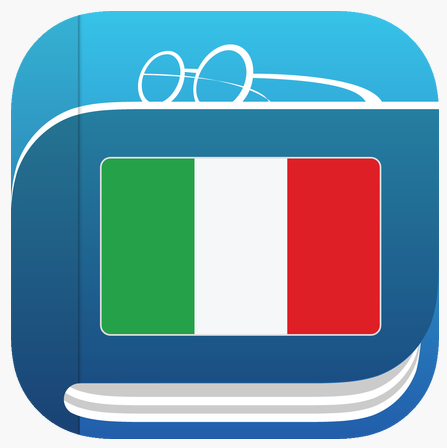Scopri i sinonimi di parole interessanti
Ops! Abbiamo difficoltà a recuperare le informazioni.
Stiamo lavorando per risolvere il problema.
Registrandoti gratuitamente su Reverso potrai consultare la tua cronologia di ricerca e salvare i tuoi preferiti.
Scarica la nostra app gratuita
Scopri e riscopri parole ed espressioni per arricchire il tuo vocabolario ed esprimerti in modo sempre più ricco e preciso.
Parti da un verbo come «impedire» e lasciati guidare dalle sue varianti e alternative come «ostacolare», «evitare», «porre fine» e dalle altre parole o espressioni che esprimono la stessa idea.
Prova a introdurre un’espressione come «ad un tratto»: troverai altri modi per esprimere l’imprevedibilità di un’azione.
Questo nuovo concetto di dizionario dei sinonimi e delle analogie si basa sull’analisi di milioni di testi in molte lingue. La scelta delle parole più appropriate avviene grazie a tecniche di intelligenza artificiale.
Copia il termine selezionato e inseriscilo nel tuo documento, naviga tra i suggerimenti, visualizzane le traduzioni e leggi gli esempi d’uso contestualizzati ascoltandone le pronunce.
Vedrai che i percorsi nell’universo delle parole, guidati dall’intelligenza artificiale, diventeranno presto un piacere da cui diventerai quasi dipendente. Arricchirai il tuo vocabolario divertendoti allo stesso tempo.
↪
L’applicazione ti consentirà di cercare frasi ed espressioni semplici come «aumento» ma anche di usare parole di un linguaggio più sostenuto come «aborrire», passando dalle une alle altre per arricchire o semplificare il tuo modo di esprimerti.
Se cerchi parole del linguaggio colloquiale come «catorcio» o «figo» rischi di scoprire parole ed espressioni molto evocative.
A volte qualche suggerimento potrà risultare un po’ strano; questo accade perché le parole vengono selezionate con procedimenti complessi. Facci sapere se c’è qualche inesattezza che possiamo correggere.
Le parole possono avere più di una categoria grammaticale e più di un significato: ad esempio «finale» può essere un aggettivo, con i significati di «ultimo» o «definitivo» e un nome, con il significato di «conclusione». Le categorie grammaticali della parola sono state separate per maggiore chiarezza.
I suggerimenti compaiono in ordine di pertinenza, e i primi tra questi sono in grassetto. E’ possibile ordinarli alfabeticamente conservando il grassetto per quelli più pertinenti. Abbiamo deciso di limitare il numero di suggerimenti a 20 per ciascuna categoria grammaticale ma in molti casi è possibile visualizzare altre decine di risultati con un click.
Sarà inoltre possibile raggruppare o separare le parole che hanno più di un significato grazie all’opzione «Raggruppa».
Alcuni sinonimi sono illustrati da esempi. Tali esempi provengono da testi di vario tipo e potrebbero non corrispondere direttamente al senso atteso. Clicca su uno dei sinonimi per visualizzare una serie di esempi che lo contengono.

By
Last updated:
January 13, 2023
“Che fai tu, luna, in ciel, dimmi, che fai?” (“What are you doing, moon, in the sky, tell me, what are you doing?”) — Giacomo Leopardi
The great Italian philosopher and poet Leopardi had deep thoughts when he gazed at the moon.
Notice, though, that he didn’t actually describe it.
Maybe he just couldn’t settle on the right words.
There are so many choices when it comes to describing things—even for something as well-known and admired as the moon.
Is it rotondo (round)? Tondo (round)?
Completo (full)? Intero (full/whole)?
The good news is that a language superstar, the synonym, gives us the ability to say the same thing in many different ways until you find exactly the perfect word.
We can describe the full moon as round by using rotondo, tondo, completo or intero. They all work!
Synonyms add dimension to your Italian, fatten up your vocabulary—and round out that moon.
Download:
This blog post is available as a convenient and portable PDF that you
can take anywhere.
Click here to get a copy. (Download)
Why Is Learning Italian Synonyms Important?
So let’s get right down to the nitty-gritty. What, exactly, are synonyms?
Synonyms are words that have the same, or almost the same definition. If you substitute a word in a sentence with its synonym, the meaning of the sentence won’t change.
It’s saying one thing in two different ways.
Although the general meaning remains the same, sometimes there are subtle nuances in a word’s meaning which can slightly change the tone of the sentence.
Think, for example, of the difference between calling someone “plump,” “chunky,” “fat” or “meaty.” Phew, those just get worse and worse! They all mean the same… but the slight difference can make or break a friendship (really, we can’t think of any situation where it’s okay to call someone “meaty”).
Learning words in groups is a good idea to help you remember them, and grouping words with similar definitions helps find a common thread between them.
One study actually found that learning synonyms together helps learners recall them better—though a previous study disproved that very same thing, so make of that what you will.
Either way, we recommend that you wait until you’re no longer a beginner, so you aren’t learning all new words, but rather new ways of saying things you already have vocabulary for.
How to Learn Italian Synonyms
If the list below has you hungry (or starving or famished) for more synonyms, here are some suggestions for how to learn them:
Grab a thesaurus to find similar word groups. Look up any common word to find a more intriguing one!
The Italian Thesaurus and Dictionary app is available for iPhone and Android users. Now you’ll never be at a loss to describe something—in multiple ways—in Italian!
With a ton of descriptive words at your disposal, your speaking and writing skills will be tremendously improved!
50 Italian Synonyms to Round Out Your Vocabulary
sottovoce, piano (in a low voice)
Both words mean “to speak quietly” but sometimes sottovoce can also indicate that a person is whispering. (The actual word for whispering is sussurro.)
lentamente, piano, adagio (slowly)
velocemente, in fretta (quickly)
Often, when we say that something or someone is moving at a fast pace, we choose the word rapidamente (quickly, fast) but here are two other ways to say a person or thing is zooming by.
Additionally, you can use fretta to encourage someone to move quickly.
For instance, if you spot the bus coming down the street when your companion is browsing the shop windows in the distance, it’s okay to call, “Fretta!” (“Hurry!”)
forte, rumoroso (loud, noisy)
Most of the time, forte is used to describe someone who’s strong.
But forte can also mean “loud”! (If you’re a musician, you probably already know this.)
grande, grosso (big)
piccolo, minuscolo (tiny, small)
Piccolo means tiny; minuscolo also means “tiny”—as well as “very tiny”!
molto, tanto (much)
Molto and tanto both convey quantity. Sometimes tanto goes beyond “much” to mean “too much” but the difference is subtle.
stesso, uguale (alike)
Uguale refers to the identical nature of things. That is, it often shows that people or places haven’t changed, that they’re alike in the sense that they remain the same as they once were.
differente, disuguale (different)
Disuguale can be used to point out that time can change people or places and that they aren’t what they used to be!
vecchio, anziano (old [age])
Vecchio can be used to reference age so it’s possible to exchange it for the synonym anziano. They both reference age although vecchio is used more often than anziano.
vecchio, antico (old [item])
Vecchio and antico both mean “old” and refer to objects. For instance:
Il tavolo è vecchio. (The table is very old.)
Il tavolo è antico. (The table is antique.)
There’s a level of extended age that’s implied by using antico although both words can be used to state that an item is just very old.
grasso, adipose (fat)
Adipose has made its way into English textbooks as “adipose tissue,” a.k.a, fat. No surprises there.
magro, sottile (thin)
Both magro and sottile mean “thin.”
Use magro to refer to people and sottile to reference items.
monotono, noioso (dull, monotonous)
simpatico, carino, buono (nice)
Italian is the language of love; is it any surprise that there are so many synonyms for the word “nice”?
Simpatico and carino are both used to refer to something nice or pleasant. They show that someone or something is pleasing to the senses.
Buono also means “nice” but it additionally indicates that something is good or okay.
It’s especially useful when describing food:
La pizza ha un sapore molto buono. (The pizza tastes very good.)
solamente, unicamente (only)
lo spasso, il divertimento (fun, enjoyment, pleasurable activity)
povero, misero (poor, unfortunate, wretched)
Povero and misero can be used to indicate someone who’s really down on their luck or in an unfortunate situation.
While povero literally means “poor” and misero literally means” miserable,” both imply a certain degree of wretchedness.
propizio, fortunato (fortunate, lucky)
Italians love buona fortuna! (good luck!) so it’s not shocking to see that they use more than one word to express good fortune.
A cultural side note: In bocca al lupo (literally: in the mouth of the wolf) is a common term to wish someone good luck!
vicino, prossimo (near)
Sometimes, prossimo is used to mean “next,” but both vicino and prossimo indicate location.
Even using prossimo to say “next” shows that whoever’s next is very near the beginning of the line!
lontano, distante (far)
adesso, ora (now)
subito, immediatamente (immediately)
più tardi, dopo (later)
Both più tardi and dopo suggest that something will occur later.
Dopo and prossimo share that unique Italian usage of inferring that someone or something is next in line to do something.
Synonyms open up so many options and enhance communication skills. They’re invaluable for adding flair to writing and depth to conversations.
Call it la luna piena (the full moon) or la luna completa (the full moon) but however you say it, show that moon in all its glory!
So use synonyms to grow your vocabulary—and reach for the Italian moon!
Buona fortuna! (Good luck!)
Download:
This blog post is available as a convenient and portable PDF that you
can take anywhere.
Click here to get a copy. (Download)
Corpus name: tatoeba. License: Creative Commons CC-BY-2.0. References: http://tatoeba.org
Corpus name: OpenSubtitles2016. License: not specified. References: http://opus.lingfil.uu.se/OpenSubtitles2016.php, http://stp.lingfil.uu.se/~joerg/published/ranlp-V.pdf
Corpus name: OpenSubtitles2016. License: not specified. References: http://opus.lingfil.uu.se/OpenSubtitles2016.php, http://stp.lingfil.uu.se/~joerg/published/ranlp-V.pdf
Corpus name: tatoeba. License: Creative Commons CC-BY-2.0. References: http://tatoeba.org
Corpus name: OpenSubtitles2016. License: not specified. References: http://opus.lingfil.uu.se/OpenSubtitles2016.php, http://stp.lingfil.uu.se/~joerg/published/ranlp-V.pdf
Corpus name: OpenSubtitles2016. License: not specified. References: http://opus.lingfil.uu.se/OpenSubtitles2016.php, http://stp.lingfil.uu.se/~joerg/published/ranlp-V.pdf
Corpus name: tatoeba. License: Creative Commons CC-BY-2.0. References: http://tatoeba.org
Corpus name: OpenSubtitles2016. License: not specified. References: http://opus.lingfil.uu.se/OpenSubtitles2016.php, http://stp.lingfil.uu.se/~joerg/published/ranlp-V.pdf
Corpus name: OpenSubtitles2016. License: not specified. References: http://opus.lingfil.uu.se/OpenSubtitles2016.php, http://stp.lingfil.uu.se/~joerg/published/ranlp-V.pdf
Corpus name: OpenSubtitles2016. License: not specified. References: http://opus.lingfil.uu.se/OpenSubtitles2016.php, http://stp.lingfil.uu.se/~joerg/published/ranlp-V.pdf
Corpus name: tatoeba. License: Creative Commons CC-BY-2.0. References: http://tatoeba.org
Corpus name: OpenSubtitles2016. License: not specified. References: http://opus.lingfil.uu.se/OpenSubtitles2016.php, http://stp.lingfil.uu.se/~joerg/published/ranlp-V.pdf
Corpus name: OpenSubtitles2016. License: not specified. References: http://opus.lingfil.uu.se/OpenSubtitles2016.php, http://stp.lingfil.uu.se/~joerg/published/ranlp-V.pdf
Corpus name: OpenSubtitles2016. License: not specified. References: http://opus.lingfil.uu.se/OpenSubtitles2016.php, http://stp.lingfil.uu.se/~joerg/published/ranlp-V.pdf
Corpus name: tatoeba. License: Creative Commons CC-BY-2.0. References: http://tatoeba.org
Corpus name: tatoeba. License: Creative Commons CC-BY-2.0. References: http://tatoeba.org
Corpus name: OpenSubtitles2016. License: not specified. References: http://opus.lingfil.uu.se/OpenSubtitles2016.php, http://stp.lingfil.uu.se/~joerg/published/ranlp-V.pdf
Corpus name: OpenSubtitles2016. License: not specified. References: http://opus.lingfil.uu.se/OpenSubtitles2016.php, http://stp.lingfil.uu.se/~joerg/published/ranlp-V.pdf
Corpus name: tatoeba. License: Creative Commons CC-BY-2.0. References: http://tatoeba.org
Corpus name: OpenSubtitles2016. License: not specified. References: http://opus.lingfil.uu.se/OpenSubtitles2016.php, http://stp.lingfil.uu.se/~joerg/published/ranlp-V.pdf
В бессмысленном ожидании в очереди, томительном напряжении в зоне турбулентности, словом, когда скучно, грустно или нужно отвлечься, я люблю играть в синонимы, заставляя себя вспоминать все больше оттенков значения, расставлять в алфавитном порядке, а также в порядке «нагнетания» интенсивности. Сегодня оттенки эмоций на примере Великого Лучано Паваротти:
essere allegro = felice, contento, raggiante, gioioso, brioso, ilare, esilarante
essere arrabbiato = rabbioso, adirato, irato, furioso, imbestialito, incavolato (груб.)
essere stanco = esaurito, pesto, stracco, arrembato, lasso, infranto, sfiaccolato, sfinito, rotto, esausto
essere triste = afflitto, malinconico, nebuloso, malinconico, frustrato, gramo, piagnucoloso, sconsolato, infelice, addolorato, d’umore nero, cupo, lugubre, abbattuto
essere sorpreso = meravigliato, stupito, sbigottito, stupito, stordito, stupefatto, scosso da stupore, esterrefatto, fulminato
essere nervoso = agitato, inquieto, irrequieto, teso, nevrastenico, irritabile, stressato
essere tranquillo – calmo, quieto, sereno, disteso, sicuro, certo, equilibrato, pacato, placido, cheto, imperturbabile
essere imbarazzato = confuso, impacciato, perplesso, smarrito, turbato
essere innamorato = spasimito, colombino, cotticcio, cascamorto, cotto, moroso
Подписывайтесь на мой Инстаграм!
Как я стала переводчиком — моя личная история и путь
ЕСЛИ ВЫ ХОТИТЕ ИЗУЧАТЬ ИТАЛЬЯНСКИЙ ИЛИ ИСПАНСКИЙ ЯЗЫК, ИЛИ ВАМ НЕОБХОДИМА КОНСУЛЬТАЦИЯ, СВЯЖИТЕСЬ СО МНОЙ ДЛЯ БЕСПЛАТНОГО УРОКА-ЗНАКОМСТВА
Мои профессиональные вебинары для переводчиков и гидов
Интервью с переводчиком. Часть 1
Интервью с переводчиком. Часть 2
Подборка самых интересных постов в моем Инстаграме — Часть 1 и Часть 2
Английский или итальянский / испанский: какой язык легче
Истории из рабочей практики переводчика
Как поддерживать в форме иностранный язык
Обязанности технического переводчика
Переводчик итальянского языка (виноделие) читайте здесь
Переводчик в магазинах итальянской мебели
Как быстро восстановить голос: советы переводчикам, гидам и преподавателям
Работа с внучкой Salvatore Ferragamo
Магия по-итальянски (работа с фокусником и иллюзионистом Эдди)
Работа с итальянскими косметологами: как все устроено
Италия в России: переводчик на Международном экономическом Форуме
Как стать профессиональным переводчиком
Итальянский и испанский: общее, различия, примеры. Какой язык выбрать
Как начать работать устным переводчиком и не бояться здесь
10 советов начинающим гидам здесь часть 1 часть 2
10 распространенных мифов о работе переводчика здесь
Список книг об Италии, которые стоит взять в путешествие (советы переводчика итальянского языка здесь)
Как найти работу переводчику без опыта (вакансии для переводчиков) здесь
Как не путать итальянский и испанский языки здесь
Советы опытного переводчика: как выучить иностранный язык здесь
Как выучить иностранный язык в совершенстве здесь
Мои переводческие ляпы, ошибки и их последствия здесь
Типичные ошибки русских в итальянском языке здесь
И другие записи в разделе Блог
Похожие слова: словарь синонимов
Синонимы & Антонимы: не найдено
Примеры предложений: словарь синонимов |
|
|---|---|
| Шамбре также отмечает, что термин logistique присутствовал в словаре Французской академии как синоним алгебры. |
Chambray osserva inoltre che il termine logistique era presente nel Dictionnaire de l’Académie française come sinonimo di algebra. |
| Любые остаточные различия между Дедом Морозом и Санта — Клаусом в значительной степени исчезли в первые годы 20 — го века, и современные словари считают термины Дед Мороз и Санта — Клаус синонимами . |
Eventuali distinzioni residue tra Babbo Natale e Babbo Natale sono in gran parte svanite nei primi anni del XX secolo e i dizionari moderni considerano i termini Babbo Natale e Babbo Natale come sinonimi. |
| Еще одна работа Падманабхадатты представляет собой словарь синонимичных и омонимичных слов под названием Бхурипрайога. |
Un’altra opera di Padmanabhadatta è un lessico di parole sinonimi e omonime chiamato Bhüriprayoga. |
| Вы одолжите мне свой словарь ? |
|
| На столе есть словарь . |
|
| У меня не очень хороший словарь . |
|
| Это мой словарь . |
|
| Я одолжу тебе этот словарь . |
|
| Предположим, что размер словаря равен 12, или, другими словами , словарь содержит 12 слов, сколько параметров нам нужно, чтобы указать эту байесовскую сеть? |
|
| Возможно, вы этого не знаете, но я опубликовал словарь , содержащий все известные иероглифы. |
|
| Словарь Вебстера определяет «приличный» в этом контексте как «адекватный, удовлетворительный». |
|
| Поколение —“совокупность тех, кто родился в одно и то же время, расширенная, чтобы включить всех живущих в данное время». —“греко — английский словарь Нового Завета”. |
|
| Сравните с OpenOffice. org словарь . |
|
| Он выпустил первую грамматическую книгу на суахили, а также словарь этого языка. |
|
| Я дал брату словарь . |
|
| Используйте словарь или проконсультируйтесь с кем — то, кто хорошо знает язык. |
|
| Этот словарь почти бесполезен. |
|
| Собираетесь купить словарь ? |
|
| Один словарь определяет признание как “принятие индивида как имеющего право на рассмотрение или внимание” и “особое уведомление или внимание”. |
|
| Тот же словарь продолжает: “папа — это как бы Бог на Земле, единственный князь верных Христу, величайший царь из всех царей”. |
|
| Этот словарь хорош. |
|
| У тебя есть сегодня словарь ? |
|
| Вы можете порекомендовать мне хороший словарь ? |
|
| Мой словарь очень полезен. |
|
| Я всегда держу под рукой словарь . |
|
| Думаю, этот словарь мне очень поможет. |
|
| Считаю этот словарь полезным для новичков. |
|
| Я заплатил 1500 иен за этот словарь . |
|











